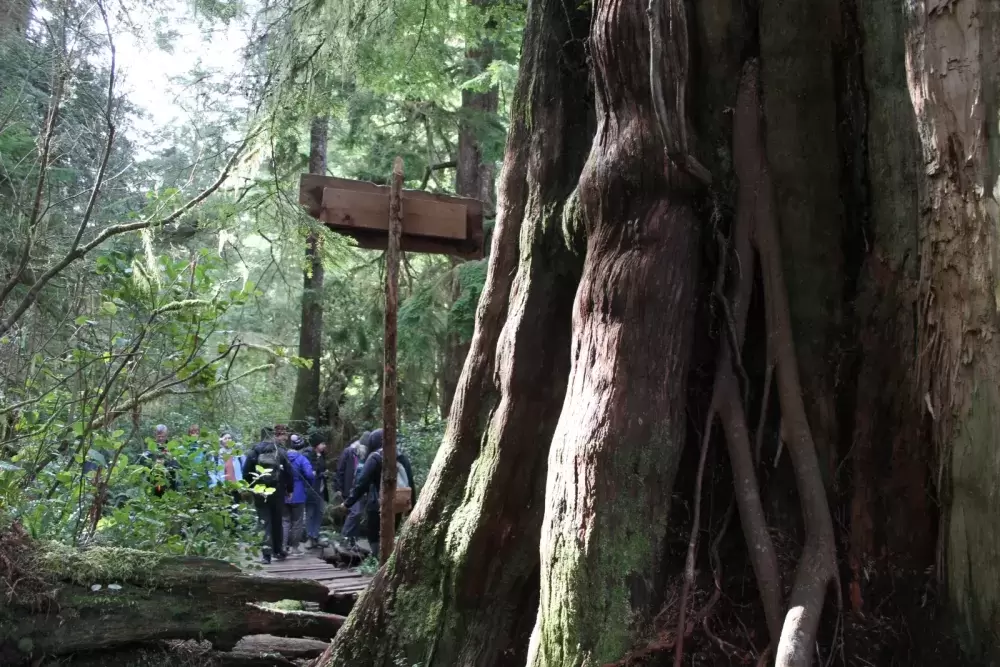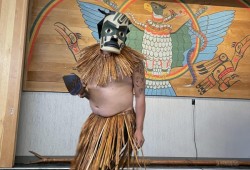In their annual report, Tla-o-qui-aht Tribal Parks states that voluntary participation in their Tribal Parks Allies programs is steadily increasing and they hope to reach their $1 million contribution goal before March 2024.
Launched in 2018, the Tribal Parks Allies Program is a voluntary certification system set up to charge a fee to businesses that operate within or benefit from Tla-o-qui-aht territory.
The Tla-o-qui-aht argue that their ha-wiih (hereditary chiefs) have, for generations, stewarded the ecosystem and resources, and that the First Nation’s people remain committed protecting their old growth forests and estuaries.
“These lands and waters are not only important to Tla-o-qui-aht and other Nuu-chah-nulth peoples, they are also enormously important to Canadians,” states the annual report.
Calling the Tribal Parks a biodiversity hotspot, the Tla-o-qui-aht say the ecosystems they care for provide clean drinking water to the communities. With the largest intact old-growth coastal temperate rainforest remaining on Vancouver Island, the region has the ability to sequester over one million tonnes of carbon dioxide.
But Tla-o-qui-aht is faced with a pressing need to support its Tribal Parks staff, infrastructure and equipment as tourism adds even more of a burden on community resources in the summer. Under the authority of TFN Ha’wiih, Tribal Parks Guardians work to protect the integrity of the ecosystems in the Tribal Parks with a vision of saving it for the future generations of Tla-o-qui-aht and their culture.
Tourism in the region was worth $230 million in direct revenue in 2018, according to Tourism Tofino. In Clayoquot Sound, First Nations have been sidelined by the lucrative tourism industry while visitors stay and play in their front yards.
But views are changing as the world begins to appreciate the value of places like the Tribal Parks and the people that have been caring for them. The Tla-o-qui-aht say their leadership and administration are supportive of tourism that is respectful of Indigenous rights, title, and self-determination.
“We believe that restructuring the tourism industry by placing equity and Indigenous rights at its foundation will strengthen the resurgence of Tla-o-qui-aht language, culture, community well being, and stewardship for abundance,” they wrote in their annual report.
Tla-o-qui-aht envisioned a way to partner with local business to support one another in a mutually beneficial way. They developed the Tribal Parks Allies as a tool to educate tourism operators about their responsibility to uphold Indigenous rights and to lead the way to a more respectful and ethical business practice.
The Tla-o-qui-aht say they have benefit-sharing agreements with other commercial sectors operating in their territories, like the logging and fishing industries. But there was nothing for tourism.
Citing landmark cases like the Tsilhqot’in Nation v. British Columbia, which affirmed Aboriginal rights and title, along with recent federal and provincial legislation which also affirms the same, Tla-o-qui-aht is urging local businesses to join the Tribal Parks Allies program, to help them protect and restore their lands – the lands tourism businesses rely on to attract visitors.
In 2019 Tribal Parks Allies program was launched, with four businesses making a total contribution of $3,750. Every year the number of Allies grew, adding anywhere from 22 to 42 each year. In 2022, the Allies contributed a total of $277,260 to the Tla-o-qui-aht Tribal Parks program.
After being featured in National Geographic Magazine in 2022 with respect to North American Indigenous stewardship traditions, Tourism Tofino offered to feature Tla-o-qui-aht Tribal Parks in their destination marketing.
Other federal and provincial government organizations stepped up with funding for various endeavors of the Tribal Park Guardians. Funds were used to support staffing, dock replacement, equipment, signage, and programs.
Funding from Pacific Economic Development Canada allowed Tla-o-qui-aht to introduce the naaʔuu interpretive dinner event series, which offered a dinner at Tin wis Best Western Resort followed by an interpretive performance telling history from the Tla-o-qui-aht perspective. This event raised $60,024 in gross ticket sales and $13,430 in art sales.
Tla-o-qui-aht is working to recruit new Tribal Parks Allies to join the 120 already participating. Today, ally contributions amount to $711,175 annually. Tla-o-qui-aht hopes to hit their contribution target of $1 million before March 2024.


